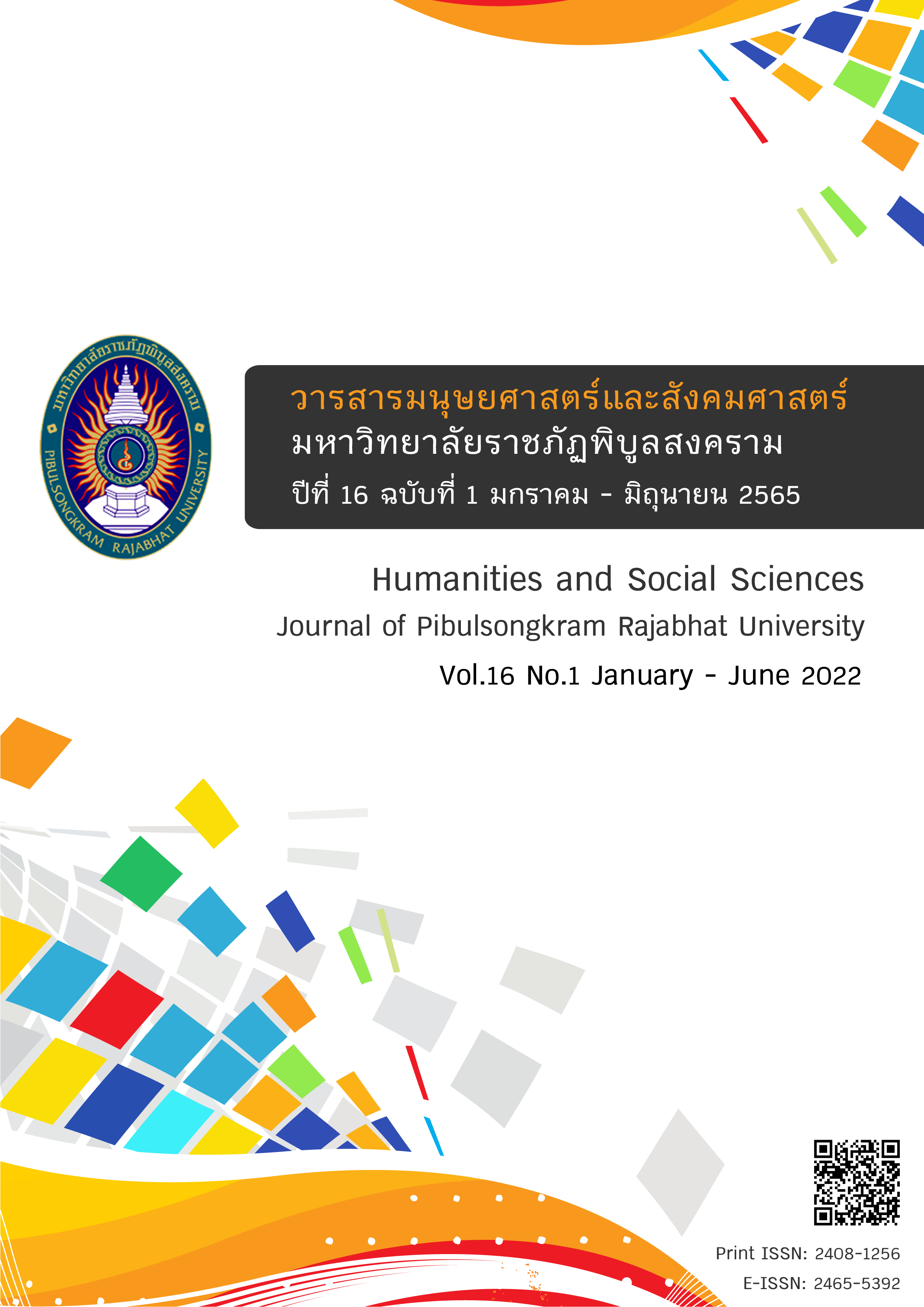The Development of Mathematics Learning Experience Management Model for Lower Secondary Level to Enhance Pedagogical Content Knowledge of Preservice Mathematics Teachers
DOI:
https://doi.org/10.14456/psruhss.2022.22Keywords:
Model of learning experience management in mathematics, Pedagogical content knowledge, Preservice mathematics teachersAbstract
The purposes of this research were 1) to develop a model of learning experience management in mathematics for the lower secondary level to promote pedagogical content knowledge (PCK) of preservice mathematics teachers and 2) to study the results of the developed model in terms of PCK. The target group to study the condition and problems is mentors, supervisors, and the 5th year preservice mathematics teachers and the target group of the experimental model and research is the 4th year mathematics preservice teachers. The research instruments were learning plans, a test of basic knowledge, a test of PCK, and a microteaching evaluation form. Data were analyzed by content analysis, frequency distribution, mean, percentage, and standard deviation. The results of this research were as follows: 1) The model of learning experience management in mathematics for lower secondary level is divided into 3 phases: Phase 1 Preparation for PCK Development, Phase 2 PCK Development, and Phase 3 Microteaching, and 2) The results of the experimental model showed that (1) preservice teachers who received teaching and learning according to the mathematics learning experience model had the average score of percentage from the test of PCK after the experiment higher than 50%, classified by purposes of measurement and content of mathematics (2) assessment results of worksheet with the average score of every content more than 50 percent and it was found that every content had an average score of episode 2 increased by more than 10 percent and (3) microteaching results found that most preservice teachers can teach all components of PCK.
References
ขจรศักดิ์ บัวระพันธ์. (2549). การพัฒนาและสำรวจความรู้ในเนื้อหาผนวกวิธีสอนของนักศึกษาครูวิชาเอกฟิสิกส์: จากวิธีสอนสู่การฝึกประสบการณ์วิชาชีพครู. สืบค้น 30 มกราคม 2559, จาก http://kucon.lib.ku.ac.th
ชมนาด เชื้อสุวรรณทวี. (2561). การเรียนการสอนคณิตศาสตร์. กรุงเทพฯ: โรงพิมพ์แห่งจุฬาลงกรณ์มหาวิทยาลัย.
บุญเลี้ยง ทุมทอง. (2559). ทฤษฎีและการพัฒนารูปแบบการจัดการเรียนรู้. กรุงเทพฯ: ทริปเพิ้ล เอ็ดดูเคชั่น.
ไพฑูรย์ สินลารัตน์. (2555). หลักและเทคนิคการสอนระดับอุดมศึกษา (พิมพ์ครั้งที่ 3). กรุงเทพฯ: มหาวิทยาลัยธุรกิจบัณฑิตย์.
วิจารณ์ พานิช. (2558). เรียนรู้สู่การเปลี่ยนแปลง Transformative Learning. กรุงเทพฯ: มูลนิธิสยามกัมมาจล.
วิทวัส ดวงภุมเมศ, และวารีรัตน์ แก้วอุไร. (2560). การจัดการเรียนรู้ในยุคไทยแลนด์ 4.0 ด้วยการเรียนรู้อย่างกระตือรือร้น. วารสารมนุษยศาสตร์และสังคมศาสตร์ มหาวิทยาลัยราชภัฏพิบูลสงคราม, 11(2), 1-14.
เวชฤทธิ์ อังกนะภัทรขจร. (2552). การสอนแนะให้รู้คิด (Cognitively Guided Instruction: CGI) รูปแบบหนึ่งของการจัดการเรียนรู้คณิตศาสตร์. วารสารศึกษาศาสตร์มหาวิทยาลัยบูรพา, 21(1), 1–11.
ศิริวรรณ วณิชวัฒนวรชัย. (2559). วิธีสอนทั่วไป. นครปฐม: ศูนย์วิจัยและพัฒนาทางการศึกษา คณะศึกษาศาสตร์ มหาวิทยาลัยศิลปากร.
สถาบันทดสอบทางการศึกษาแห่งชาติ. (2560). สรุปผลการทดสอบทางการศึกษาระดับชาติขั้นพื้นฐาน (O-NET) ชั้นมัธยมศึกษาปีที่ 3 ปีการศึกษา 2560. สืบค้น 17 ธันวาคม 2561, จาก http://www.newonetresult.niets.or.th
สมวงษ์ แปลงประสพโชค. (2549). ปัญหาการเรียนการสอนคณิตศาสตร์และแนวทางแก้ไข. วงการครู, 3(31), 78–80.
สมศักดิ์ ภู่วิภาดาวรรธน์. (2543). หลักการสอนเพื่อพัฒนาผู้เรียนและการประเมินตามสภาพจริง. กรุงเทพฯ: ดวงกมลพับลิชชิ่ง.
อุภาวัณณ์ นามหิรัญ. (2559). การพัฒนากรอบการประเมินสมรรถนะด้านการจัดการเรียนรู้และการรู้วิชาเฉพาะด้านของนักศึกษาครูภาษาไทย. มนุษยสังคมสาร (มสส.), 14(2), 207–214.
Barnett, J., & Hodson, D. (2001). Pedagogical context knowledge: Toward a fuller understanding of what good science teachers know. Science Education, 85(4), 426-453.
Burnard, P. (1996). Acquiring Interpersonal Skills: A Handbook of Experiential Learning for Health Professionals (2nd ed.). London: Chapman and Hall.
Cochran, K. F., DeRuiter, J. A., & King, R. A. (1993). Pedagogical content knowing: An integrative model for teacher preparation. Journal of teacher Education, 44(4), 263-272.
Jaques, D. (1993). Designing and Evaluation Courses. New South Wales: Educational Methods Unit. Oxford Brooke University.
Kinach, B. M. (2002). A cognitive strategy for developing pedagogical content knowledge in the secondary mathematics methods course: Toward a model of effective practice. Teaching and teacher education, 18(1), 51-71.
Kolb, D. A. (1984). Experiential Learning: Experience as the Source of Learning and Development. New Jersey: Englewood Cliffs.
Mezirow, J. (2003). Transformative learning as discourse. Journal of transformative education, 1(1), 58-63.
Shulman, L. (1987). Knowledge and teaching: Foundations of the new reform. Harvard educational review, 57(1), 1-23.
Silverman, J., & Thompson, P. W. (2008). Toward a framework for the development of mathematical knowledge for teaching. Journal of mathematics teacher education, 11(6), 499-511.
Veal, W. R., van Driel, J., & Hulshof, H. (2001). PCK: How Teachers Transform Subject Matter Knowledge. International Journal of Leadership in Education, 4(3), 285-91.
Zembal‐Saul, C., Blumenfeld, P., & Krajcik, J. (2000). Influence of guided cycles of planning, teaching, and reflection on prospective elementary teachers' science content representations. Journal of Research in Science Teaching: The Official Journal of the National Association for Research in Science Teaching, 37(4), 318-339.
Downloads
Published
How to Cite
Issue
Section
License
Copyright (c) 2020 Humanities and Social Sciences Journal of Pibulsongkram Rajabhat University

This work is licensed under a Creative Commons Attribution-NonCommercial-NoDerivatives 4.0 International License.
Any articles or comments appearing in the Journal of Humanities and Social Sciences, Rajabhat Phibulsongkram University, are the intellectual property of the authors, and do not necessarily reflect the views of the editorial board. Published articles are copyrighted by the Journal of Humanities and Social Sciences, Rajabhat Phibulsongkram University.









